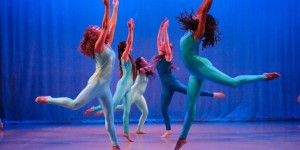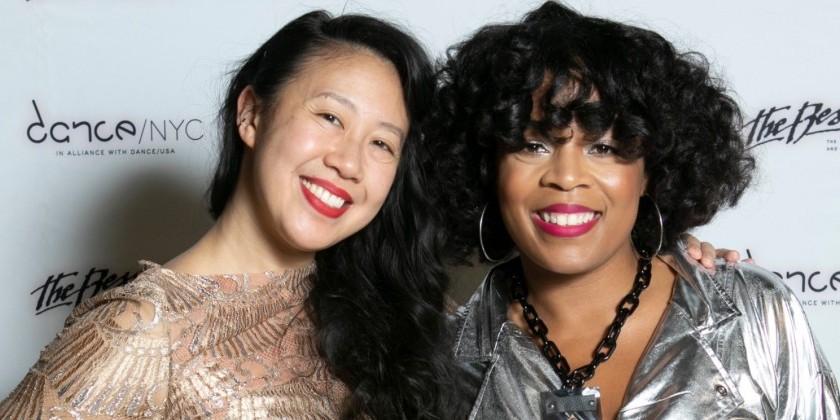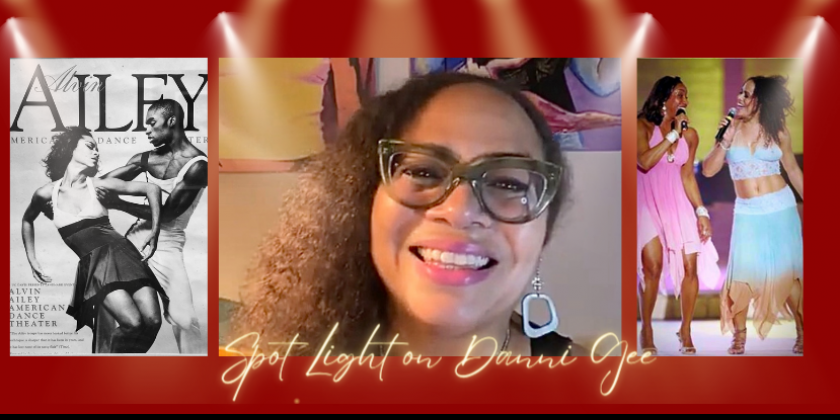IMPRESSIONS: “Everyman’s Reroof” with Moving Visions Dancers and Dances by Isadora

April 6, 2019
Baruch Performing Arts Center
Choreography: Isadora Duncan, Catherine Gallant, Loretta Thomas
Conductor Yoon Jae Lee and Ensemble 212
Almost a century after her death, Isadora Duncan’s dances are still recognizable. Her style is distinguished by its exuberant skips, emphasis on the solar plexus, and uplifted hands that indicate a column-like pathway from earth to sky. Duncan was the mother of modern dance, a radical bohemian, and a champion of free, natural movement. Her works were revolutionary in the early twentieth century when ballet dominated the concert dance world.
But today, her technique can fall flat for audiences who are accustomed to a great range and fusion of dance styles as well as stunning feats of athleticism. However, Duncan’s works have an emotional resonance that makes them timeless and accessible. Grace and lightness pervade each gesture; joy and sorrow are conveyed in the tilt of the head or cast of the eye. Because her technique uses breath to direct and delineate movement, it elicits a visceral response — we have all felt the rise and fall of our chests in times of elation, grief, and anxiety.

Duncan technique requires exceptional physical awareness and emotional maturity. The 13 dancers of Moving Visions and Dances by Isadora meet this challenge seamlessly. In Scherzo, staged by Moving Visions Artistic Director Loretta Thomas, Abra Cohen, Jessie King, Holly Mitchell, and Corinne Shearer gallop across the stage, torsos exuberantly lifted, arms flinging to the sky. Cohen’s smile and gracious tilt of her swan-like neck are infectious while King’s passion is palpable.
Despite the limited vocabulary, magic can be found in the subtlety and emotion imbued in familiar steps by each performer. During Prelude from Duncan’s Chopin Suite, Catherine Gallant is an aching figure, pensive and searching. At one moment hopeful while the next dejected and resigned, she gingerly approaches the space around her, delicately reaching and rushing toward something, only to fold into herself as what she seeks remains out of reach.
Gallant, well versed in Duncan technique and philosophy, brings a breadth of knowledge and skill to the work. Thomas, also a veteran Duncan dancer, commands the stage with supple strength. In a company of beautiful, unique performers, Gallant and Thomas offer the refinement that comes from wisdom and experience.
The evening effortlessly transitions from the classics to newer works, with Ensemble212 offering palette-cleansing interludes of Vivaldi and Schubert throughout the evening, which makes for two concerts in one.

Gallant’s Chamber Duet, an excerpt from Escape from the House of Mercy, contrasts to the sustained flow of the preceding dances. As trumpeter Kevin Blanq blows staccato notes, four women engage in a weighted partner dance characterized by pushing and pulling. Struggling to assert themselves, they drag each other down, sit on one another, and entwine in frustrated, desperate shapes.
Thomas’ Homage is Duncan minus the flow. Angular and grounded, many of Duncan’s signature steps are recognizable, but performed with a modern twist. Reminiscent of modern dance pioneers Martha Graham and Merce Cunningham, the piece deconstructs unison and repetition to fill the stage with congruent movements performed simultaneously.
Stephen Barber‘s score, while complementary to the classicism of the first half, allows the dancers to interrupt the continuity with more clipped phrasing. A clever and witty reconstruction, Thomas’ original choreography, which dominates the second half, merges her knowledge of Duncan technique with contemporary sensibilities, thus creating a cohesive, diverse, and satisfying evening.













